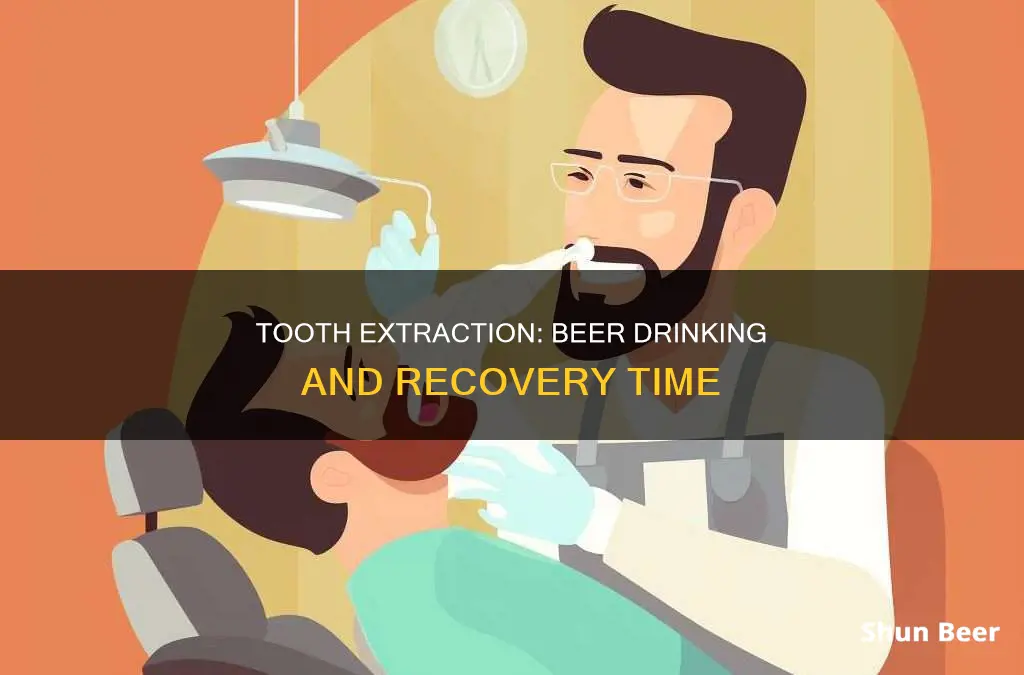
Drinking alcohol after a tooth extraction is not recommended by dentists, as it can cause dehydration, hinder recovery, and create health problems such as pain, infection, and dry socket. Alcohol can also thin the blood, making it harder for a clot to form and delaying healing. It is typically recommended to wait at least 48 hours and up to 7 to 10 days before consuming alcohol after a tooth extraction, and to finish any prescribed pain medication before drinking.
| Characteristics | Values |
|---|---|
| Drinking alcohol after tooth extraction | Not recommended |
| Reason | Hinders recovery, increases bleeding, dehydrates, interacts with pain medication |
| Waiting period | 48 hours to 10 days |
| Alternative | Painkillers |
What You'll Learn
- Alcohol thins the blood, hindering blood clot formation
- Drinking alcohol can lead to dehydration, which is detrimental to recovery
- Combining alcohol with pain medication can be dangerous
- Alcohol can cause delayed healing
- It's best to wait at least 72 hours, or even 7-10 days, before drinking alcohol after a tooth extraction

Alcohol thins the blood, hindering blood clot formation
Alcohol is a blood thinner and can hinder blood clot formation. This occurs in two ways: firstly, alcohol reduces the number of platelets in the blood, and secondly, it makes the platelets less sticky. Platelets are the blood cells that rush to the site of an injury and form clots by clumping together. Therefore, alcohol's impact on platelets means that blood clots are less likely to form.
A study at Georgetown University Medical Center found that the amount of alcohol in two drinks could decrease platelet clumping. However, the study did not determine how long this effect lasts, and further research is needed. It is also unclear whether the alcohol itself or other beverage components, such as those found in red wine, are responsible for influencing platelet clumping.
Drinking alcohol can increase the risk of bleeding strokes, especially when consumed in large quantities. For men, this means more than two drinks per day, and for women, more than one drink per day. Additionally, heavy drinking can lead to a rebound effect, increasing the risk of bleeding even after the individual has stopped drinking.
While moderate drinking may have some cardiovascular benefits, such as reducing the risk of strokes caused by blockages in blood vessels, the risks associated with alcohol consumption outweigh any potential benefits. Alcohol contributes to various disease processes affecting vital organs such as the liver, heart, and pancreas. It also increases the risk of injuries, accidents, certain cancers, and other health complications.
Therefore, it is recommended to avoid drinking alcohol after a tooth extraction, as it can negatively impact the healing process and increase the risk of complications such as dry socket. It is best to wait at least 48 hours and up to 7-10 days before resuming alcohol consumption to ensure a successful recovery.
Workplace Attire: Beer Shirts, Appropriate or Not?
You may want to see also

Drinking alcohol can lead to dehydration, which is detrimental to recovery
Drinking alcohol after a tooth extraction is not recommended, as it can negatively impact the healing process. One of the main reasons for this is that alcohol can lead to dehydration, which is detrimental to recovery.
Tooth extraction is a common dental procedure that involves removing a tooth from its socket in the jawbone. Following the procedure, a blood clot must form in the empty socket to protect the underlying bone and nerves and initiate the healing process. This typically takes about a week or more. Dehydration can hinder the formation of this blood clot, leading to a condition called dry socket.
Dry socket occurs when the blood clot in the extraction site becomes dislodged or fails to form, leaving the nerves and bone exposed. This condition can result in extreme pain and discomfort, with pain radiating from the mouth throughout the face. It can also increase the risk of infection, requiring additional treatment and slowing down the recovery process.
To promote healing and prevent dry socket, it is crucial to stay hydrated by consuming water or other hydrating beverages. Alcohol, on the other hand, can dehydrate the body and disrupt the blood clotting process. Therefore, it is advisable to avoid alcoholic beverages for at least 72 hours, but preferably 7 to 10 days, after a tooth extraction to ensure optimal healing.
In addition to dehydration, alcohol consumption can also thin the blood, potentially leading to increased bleeding after the procedure. This can further hinder the formation of blood clots, which are essential for protecting the extraction site and facilitating healing.
To summarise, drinking alcohol after a tooth extraction can lead to dehydration, which can negatively impact the formation of blood clots and slow down the recovery process. It is important to prioritise hydration and allow the body to heal by choosing water or other non-alcoholic beverages during the recovery period.
The Fizziness in Beer: How Carbonation Works
You may want to see also

Combining alcohol with pain medication can be dangerous
It is strongly advised to refrain from drinking alcohol after oral surgery and once you have finished taking your pain medication. Mixing alcohol with pain medication can be very dangerous and can lead to liver failure, impaired motor function, dizziness, overdose, and even death.
Alcohol interacts with painkillers in different ways, depending on the type of medication. For example, combining alcohol with anticonvulsants or antiepileptics can increase the risk of seizures and cause severe drowsiness and lightheadedness. Mixing alcohol with opioids can be lethal, leading to drowsiness, memory problems, breathing problems, and accidental overdose. Even alcohol and over-the-counter NSAIDs can increase the risk of developing ulcers or liver damage over time.
The combination of alcohol and antidepressants can have devastating consequences, especially in adolescents. It can increase feelings of hopelessness and suicidal thoughts, as well as cause drowsiness, dizziness, and accidental overdose. Women are more prone to dangerous drug interactions, liver damage, and other alcohol-induced health issues than men. This is because alcohol reaches a higher concentration in the female body, leading to a higher risk of organ damage, especially to the liver.
Older people are also at a higher risk of harmful alcohol-medication interactions. As the body ages, it becomes slower at breaking down alcohol, causing it to remain in the system longer. Older individuals are also more likely to be prescribed medications that interact negatively with alcohol.
To ensure a safe recovery, it is best to abstain from alcohol until you no longer require pain medication.
Millenials' Work Culture: Beer on the Job?
You may want to see also

Alcohol can cause delayed healing
After a tooth extraction, a blood clot must form in the extraction area until granulation tissue forms, which can take a week or more. Alcohol thins the blood, potentially making you bleed more after the extraction. This can prevent blood cells from bonding and forming a clot. If the blood can't clot, or if the clot becomes dislodged, you could develop a dry socket, a painful condition that slows the recovery process.
Alcohol can also cause dehydration, which can cause the blood clot to become dry and dislodge. This can lead to a dry socket and potential infection. In addition, drinking alcohol while taking pain medication can increase the risk of negative side effects and interactions, such as dizziness, nausea, and impaired judgment.
To avoid these complications, it's best to avoid alcohol for at least 72 hours after a tooth extraction, but longer is better. Dentists generally advise avoiding alcohol for 7 to 10 days to give the extraction site time to heal and the blood clot to form completely.
Instead of alcohol, it's important to drink water or other hydrating beverages during the recovery period to stay hydrated and promote healing.
In conclusion, alcohol consumption after a tooth extraction can cause delayed healing by interfering with blood clot formation and hydration, as well as creating issues when combined with pain medication. Therefore, it is recommended to abstain from alcohol and follow your dentist's aftercare instructions for a successful recovery.
Beer Traps: Effective Snail Control or Urban Myth?
You may want to see also

It's best to wait at least 72 hours, or even 7-10 days, before drinking alcohol after a tooth extraction
It is best to wait at least 72 hours, or even 7–10 days, before drinking alcohol after a tooth extraction. Alcohol consumption can hinder the healing process and create health problems, including pain, infection, and dry socket.
Tooth extraction involves removing a tooth from its socket in the jawbone. After a tooth is removed, a blood clot must form in the empty socket to protect the underlying bone and nerves and promote healing. This process can take up to a week or more. If the blood doesn't clot, or if the clot becomes dislodged, you can develop a dry socket, a painful condition that slows down the recovery process.
Alcohol consumption can delay the formation of blood clots and even cause them to dislodge. Alcohol thins the blood, potentially making you bleed more after tooth extraction and preventing blood cells from bonding and clotting. Additionally, alcohol can dehydrate you, and staying hydrated is crucial for a healthy and speedy recovery.
Another issue with drinking alcohol after tooth extraction is the potential interaction with pain medications. It is common for dentists to prescribe painkillers or recommend over-the-counter pain medications to manage post-surgical pain. Mixing these medications with alcohol can be dangerous and lead to serious side effects such as liver failure, impaired motor function, dizziness, and overdose.
To ensure a smooth recovery, it is best to wait until you no longer require painkillers before resuming alcohol consumption. This typically takes around 72 hours, but waiting for a full 7–10 days is ideal to allow the extraction site to heal completely. During this time, it is recommended to drink water to stay hydrated and promote faster healing.
Understanding Beer Siphons: How Do They Work?
You may want to see also
Frequently asked questions
No. It is not recommended to drink alcohol after a tooth extraction.
Drinking alcohol can hinder the healing process and increase the risk of infection. Alcohol can also thin your blood and prevent clotting, which is necessary for the wound to heal.
It is recommended to wait at least 72 hours and ideally 7-10 days before consuming alcohol.
It is recommended to drink water to stay hydrated and aid the healing process.







